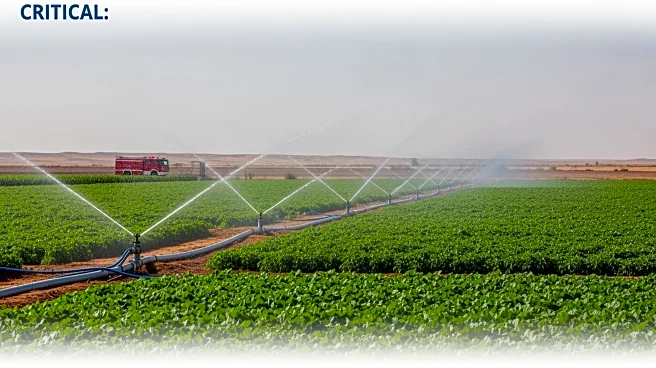What's Happening?
Farmers in the Barind region are increasingly adopting crop diversification strategies to combat declining groundwater levels and persistent drought conditions. This shift involves moving from traditional irrigation-intensive crops like Irri-Boro paddy
to low-water-consuming and high-value crops such as wheat, maize, lentils, chickpeas, and oilseeds. Additionally, fruits like mango, guava, malta, and dragon fruit are being cultivated to improve water efficiency and enhance farmer incomes. Agricultural specialist Monzurul Huda emphasizes the importance of expanding drought-tolerant crop varieties to sustain agriculture in this climate-vulnerable zone. The transition aims to mitigate water scarcity and reduce pressure on underground sources, as surface water bodies face threats from unplanned usage and environmental degradation.
Why It's Important?
The adoption of water-smart farming practices in the Barind region is crucial for ensuring sustainable agriculture amid intensifying climate threats. By reducing dependence on groundwater and promoting diversified crop farming, farmers can enhance food security and strengthen resilience to climate shocks. This shift not only supports sustainable development goals but also offers tangible benefits such as increased incomes and new employment opportunities in agriculture. The initiative aligns with broader efforts to conserve biodiversity and ensure water security, which are essential for long-term agricultural sustainability and food security in the region.
What's Next?
The ongoing decline in the groundwater table necessitates scaling up diversification strategies to safeguard the future of agriculture in Barind. Experts advocate for nature-based and integrated water resource management solutions that consider political, social, and environmental realities. Policy support must be enhanced to encourage widespread adoption of sustainable agricultural practices. Farmers are urged to transition toward drought-tolerant crops to lessen dependence on high-irrigation agriculture, ensuring the rights of farmers are protected and food demands are met.
Beyond the Headlines
The shift to water-smart farming in Barind highlights the ethical and environmental dimensions of sustainable agriculture. It underscores the need for policies that protect farmer rights and promote biodiversity conservation. The initiative also reflects broader cultural shifts towards valuing environmental sustainability and resilience in agriculture, which are critical in the face of accelerating climate change.















